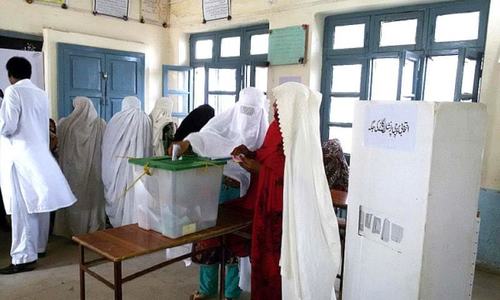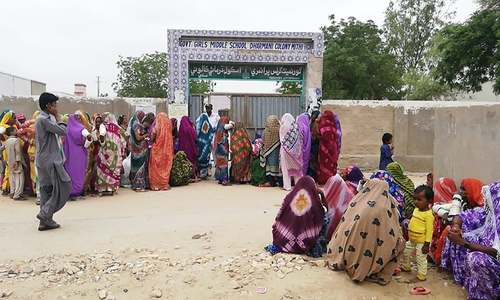ISLAMABAD: The Election Commission of Pakistan (ECP) is set to void polls, and their results, in two national assembly constituencies over low turnout of female voters.
“A summary has been moved to the Commission by the ECP secretariat recommending that the polls in NA-10 (Shangla) and NA-48 (North Waziristan) — where women votes were less than 10 per cent of the total polled votes — be declared void,” a source in the ECP told Dawn on Thursday.
Read: Thari women set example for all with nearly 73% turnout in 2018 elections
The number of registered voters in a constituency includes both men and women who have registered to vote. The 10pc law was passed to ensure that women participated in the polls, and were not marginalised or coerced into not voting. According to the rules, if among the total votes cast in a constituency, the share of women in the final count is less than 10pc, the results of the polls may be declared void.
Shangla NA seat was won by PML-N candidate while an independent candidate clinched North Waziristan seat
In NA-10 (Shangla) the total number of registered voters is 374,343. Out of the 212,294 male voters, 115,639 (54 pc) cast their votes while only 12,663 women from the total registered 162,049 female voters turned up to vote. The total votes cast in the constituency was 128,302 and the 12,663 female votes was less than 10pc of the total votes.
Ibadullah Khan of Pakistan Muslim League-Nawaz had won the seat by clinching 34,070 votes in a closely contested battle with Saeed ur Rahman of the Awami National Party who bagged 32,665 votes. It was one of 44 constituencies where the number of rejected votes was higher than the margin of victory.
In NA-48 (Tribal Area) the total number of registered voters was 274,205. Out of the 196,668 male voters, 57,600 (29.28 pc) and out of a total 77,537 female voters just 6,364 (8.19 pc) turned up to vote. Women voters fell short of just 32 votes to attain the 10pc share in the total polled votes. The seat was won by Mohsin Javed — an independent — by securing 16,496 votes defeating the PTI’s Aurangzeb Khan who managed 10,369.

There were many other constituencies where the turnout for women voters remained low, but above the yardstick of 10pc of the total vote. In NA-44 (Tribal area), out of the total 114,261 female voters, just 10,849 voted. The total number of registered voters in the constituency was 265,217, which included 150,956 men — 59,295 (37.29pc) of them voted.
Likewise, in NA-49 (Tribal area VIII) out of the total 81,207 registered female voters, merely 12,001 women turned up to vote. In NA-50 (Tribal area IX) just 7,513 of the total 44,865 registered female voters exercised their right to vote. In NA-33 (Hangu), out of the total 118,650 women voters 22,001 cast their votes.
In NA-268 (Chaghai) out of the total 99,613 women voters, 20,606 voted. Surprisingly, the female turnout in terms of percentages — relative to the total registered votes — was higher than the men. Out of the total 134,678 male registered voters in the constituency just 27,618 (20.65pc) polled their votes.
In as many as 18 constituencies, the women voters’ turnout was higher in terms of percentage against male voters. In NA-271 (Tharparkar i) 72.83pc of the total registered voters cast their votes. The proportion of male voters in the constituency was 65.39 percent. NA-222 (Tharparkar II) was similar — with a positive that this was the only constituency where over seventy percent of the voters, both male and female, exercised their right to vote. 71.40pc of the registered female voters and 70.51pc of the male voters cast their votes. In NA-56 (Attock) 63.03pc of the women polled their votes compared to 62.19pc male voters. In NA-186 (Muzaffargarh VI) 61.85pc women and 58.85pc men polled their votes. In NA-1 (Chitral) 61.57pc female and 60.49pc male voters exercised their vote.
In NA-64 (Chakwal I) 60.72pc women and 55.67pc men turned up to vote. Other constituencies where women voter turnout was higher than the men included NA-46, NA-58, NA-65, NA-66, NA-67, NA-68, NA-70, NA-71, NA-72, NA-74, NA-76, and NA-77.
Still however — overall — there were many constituencies where women represented less than one-third of the total votes cast that showcases that we are from inclusive elections in the country.
Published in Dawn, August 3rd, 2018













































